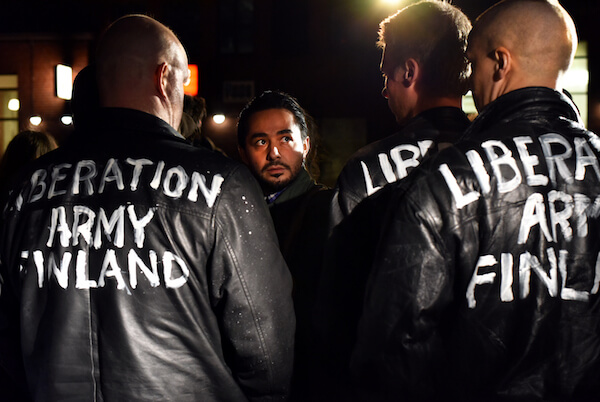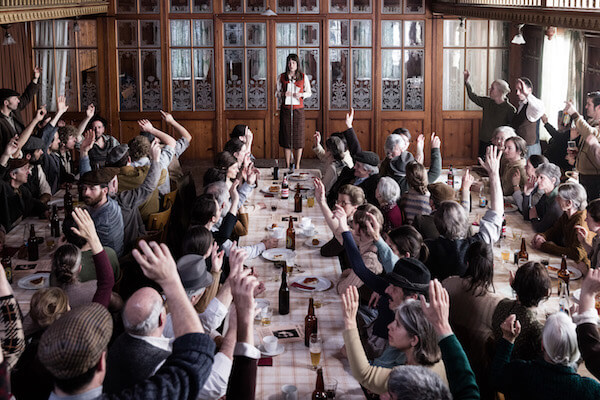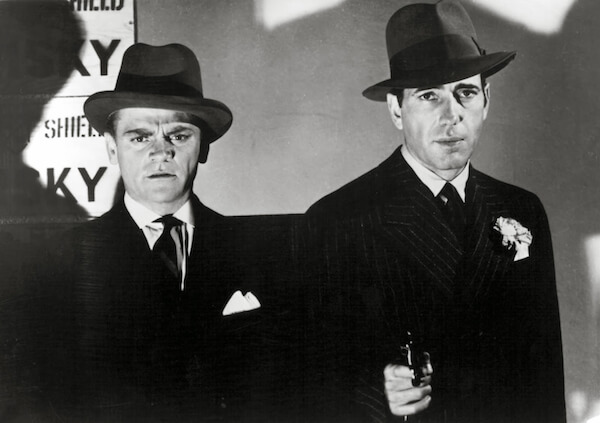Charles Laughton (right) in Cecil B. DeMille’s “Sign of the Cross.” COURTESY: | PHOTOFEST VIA FILM FORUM
Charles Laughton (1899-1962) was the Meryl Streep of his day. A universally acclaimed actor — many thought him the finest of his generation — with the most varied and fulsome technique, he played seemingly everything, from kings to bums. And, like Streep, when he was good, he was very, very good, but when he was bad, the hammy scenery chewing could be laughable, if not downright repulsive.
Film Forum is filling February with a wonderful retrospective of his work, which should be a master class for all actors, both successful and aspiring, in how — and how not — to do it. Laughton, whom Laurence Olivier described as the only genius among actors he knew, could be transcendent (“Rembrandt,” “The Hunchback of Notre Dame,” “The Private Life of Henry VIII,” “Mutiny on the Bounty”) or unwatchable (“They Knew What They Wanted,” as the most heavily accented, unconvincing Italian until Streep in “The Bridges of Madison County,” or “Hobson’s Choice,” in which David Lean’s indulgence of a drunk scene featuring him represents some of the most excruciating moments in cinema).
Though married for life to the gifted actress Elsa Lanchester, Laughton was gay, and it was something everyone in show business knew about. Writer Eric Bentley, who translated Brecht’s “Galileo” for him, told me of once seeing him dining with a beautiful, markedly younger man, having an easy-to-overhear conversation, the upshot of which was that if he wanted to order champagne, the lad’s skills at oral sex would definitely be called upon later.
Film Forum salutes great gay actor with comprehensive retrospective
In her memoir, Lanchester, possibly bisexual herself, recalled a moment early in their marriage when she came home to find a policeman there as well as a hustler who wanted money, claiming Laughton had picked him up earlier in the day. Her husband torturously confessed to having a homosexual liaison in their home. Lanchester wrote that she realized theirs would be a different, asexual sort of marriage, “but I had the couch burned.” Laughton, forever feeling ugly and undesirable, had handsome young men wafting in and out of his life, often under the guise of an on-set personal assistant or masseur, something Lanchester bore but which at times led to heartbreak for her hopelessly romantic husband. Raised Roman Catholic, Laughton supposedly felt deep guilt about his nature, and certain ugly professional incidents did nothing to assuage that. When he directed “The Caine Mutiny Court Martial” on Broadway, an irate Henry Fonda exploded at Laughton, saying, “What do you know about men, you fat faggot?”
When she married Laughton, Lanchester wrote, she had no idea of his homosexuality, explaining, “Remember, he was a great actor.” Toward the end of his life, Laughton found some peace when the couple moved next door to the Santa Monica home of Christopher Isherwood and his lover, Don Bachardy, whose open acceptance of being gay had a salutary effect on him.
Here are some of the Film Forum highlights:
“The Private Life of Henry VIII” (1933) Laughton’s most famous role and the one he put such a stamp on that every subsequent actor who played this monarch paled by comparison. Henry’s insatiable appetite, childishly incorrigible sense of entitlement, and fearsome streak of cruelty were painted in the broadest strokes. Acting this rich and florid had rarely been seen on the screen before, apart from John Barrymore, and the entire world took this actor to their hearts. (February 22)
“The Old Dark House” (1932)
James Whale’s screwball horror film shows that, hammy as he could be, Laughton was also adept at being an ensemble player, as a brash Yorkshire blowhard trapped one stormy night in J.B. Priestley’s creepy yet hilarious nest of maniacs. It’s maybe the one movie in which he fades into the background, even Laughton being no match for the side-splitting, eccentric antics of religious fanatic and harridan Eva Moore (‘No beds! They can’t have beds!”), a grunting Boris Karloff, still very much in Frankenstein mode, as a psychopathic butler, veteran British actress Elspeth Dudgeon playing a man, the ancient, bedridden yet homicidal paterfamilias of this bizarre household, and, especially, the invaluable, desiccated Ernest Thesiger, tellingly named Horace Femm here, as Laughton’s recalcitrant, though occasionally gracious host. (February 12)
“The Sign of the Cross” (1932)
A definite must-see on the big, silver screen, Cecil B. DeMille’s delirious chef-d’oeuvre remains the definitive Christians versus Romans ancient epic, combining swoony royal court decadence with pious Jesus freak covert meetings, all of it culminating in the Colosseum where bloodthirsty crowds roar for more gore. Savage Amazon women are pitted against pygmies, crocodiles hungrily advance on chained, squirming virgins, and lions have a very devout din-din. It’s also one of the sexiest pre-Code films of its era, with creamy Claudette Colbert as delectably wicked Empress Poppaea bathing in asses’ milk, revealing nipplage, and an orgy featuring the bizarre performer Joyzelle (looking ready for “RuPaul’s Drag Race”) practically giving a lesbo lapdance to the impossibly pure heroine (lovely Elissa Landi).
From his first scene, literally fiddling while Rome burns, Laughton dominates this film, draped in togas that often reveal a hairlessly smooth, unsettlingly soft body that has known naught but luxury and sensual excess. The big “quean” (sic) was how James Agate, an eminent gay critic of the day startlingly described Laughton’s Nero, with his fake Roman nose, naked male slave boy, and over-the-top lasciviousness (“Delicious debauchery” he murmurs, recalling the previous night’s orgy). Audiences had no choice but to succumb to this magnificently monstrous presence. Laughton, as a result, became rather typecast, playing assorted maniacs for the next two years. (February 22 & 26)
“The Devil and the Deep” (1932) Given your choice of Gary Cooper, Cary Grant, or fanatically jealous husband Laughton, a submarine commander, who would you choose? That’s the dilemma that befalls Tallulah Bankhead in this entertaining, exotic potboiler, which features Tallu (who called Laughton “Charlotte”) at her most decadently beautiful, wandering in a skimpy Travis Banton evening gown through a Moroccan souk. She’s saved from ruffians by Cooper who says, “You look half-dazed.” Her hilarious riposte: “That’s my normal expression.” An enraged Laughton tries to kill them as well as himself when he sabotages the submarine they find themselves in, but Cooper’s charms do not go unnoticed by him as he observes, “It must be a happy thing to look like you. It must be a happy thing.” (February 12)
“The Island of Lost Souls” (1933)
The definitive movie version of H.G. Wells’ “The Island of Dr. Moreau,” this truly hair-raising, horrific thriller features Laughton, ballistically crazy, in the title role, reveling in human experimentation and the Neanderthal creatures he creates, over whom he holds complete sway. Amusingly, he based the malevolent look of his character on his dentist. (February 18)
“The Barretts of Wimpole Street” (1934)
The puritanically censorious Hays Code had set in and producer Irving Thalberg wondered how the incestuous love of Edward Barrett for his poetess daughter (Norma Shearer, tremulously proffering her classic profile) could be explicitly conveyed. “Don’t worry,” Laughton assured him, “they can’t censor the gleam in my eye,” and, indeed, his portrait of an implacably evil Victorian head of the household defines an entire epoch of mutton-chopped repression. One of the legendary stage successes of its day, starring Katharine Cornell, this handsomely produced melodrama still exerts an inexorable dramatic grip, and boy! do you hate Laughton here (“Kill her dog!”). (February 8-9)
“Mutiny on the Bounty” (1935)
Laughton capped his obsessively villainous period with his universally acclaimed — and infinitely parodied — portrayal of Captain Bligh, which won the first New York Film Critics Award for Best Actor. It was said that homophobic star Clark Gable (as Fletcher Christian) couldn’t stand Laughton and, at one point, when director Victor Fleming told him to “butch it up, for God’s sake,” Laughton retorted, “That’s character work, for which I get paid extra.” (February 8-9)
The second half of the 1930s, the decade in which Laughton most thrived, was marked by performances of greater sympathy and an even deeper humanity:
“Ruggles of Red Gap” (1935)
Leo McCarey’s film is a revered classic, but I find Laughton’s acting here erratic, twee, and sometimes simperingly self-indulgent, hinting at certain woeful excesses to come. The film and, indeed, time, itself, however, stand still with his famed reciting of the Gettysburg Address to a saloonful of Western rowdies. This scene momentarily elevates the film into something truly special, proving the actor’s unmatched oratory skills. (February 16)
Charles Laughton in Alexander Korda’s “Rembrandt.”COURTESY: | PHOTOFEST VIA FILM FORUM
“Rembrandt” (1936)
This film marks Laughton’s greatest performance, in a literate, low-keyed but passionate and exquisitely designed evocation of the great artist’s life. Here, a number of Biblical passages are graced by his hushed, elemental delivery of them. This Rembrandt communicates verbally as well as he does through his paintbrush, and you recognize clearly that it takes a genius to fully portray one. A delicate-looking Lanchester plays his doomed young wife, and the tenderness they share was doubtlessly true in life, as well. (February 9)
“I Claudius” (1937)
The most fascinating rarity in the series is a 1965 BBC documentary, “The Epic That Never Was,” about the making of Josef von Sternberg’s unfinished film of the Robert Graves classic. Marvelously narrated by Dirk Bogarde, it includes hypnotically lavish footage and interviews with Graves and the redoubtable von Sternberg, as well as surviving cast members Emlyn Williams (Caligula), Merle Oberon (Messalina), and Flora Robson (Agrippina). Plagued by ill-fortune, including a car crash for Oberon and Laughton’s inability to access Claudius (until Edward VII’s abdication speech inspired him), it’s a pity this was never completed. One can only imagine the kind of ancient Rome genius von Sternberg would have concocted after “The Scarlet Empress,” his orgiastic take on Russia’s Catherine the Great. The bits of Laughton’s performance that remain are tantalizing and heart-breaking. (February 22)
“St. Martin’s Lane” (1938)
This is my personal favorite Laughton performance. As a slightly dim street busker, who falls haplessly in love with a pickpocket (a ravishingly young Vivien Leigh) who rises to stardom and leaves him in the dust, he has an ineffable, innate gallantry. An obvious lost cause, you nevertheless root for him, even as he makes every wrong decision, culminating in a truly heartbreaking, smile-through-your tears finale with him bellowingly reciting Rudyard Kipling’s all-too-apropos poem “If.” For years, Tony Walton, who also loves it, has been trying to produce a musical version of this property. (February 11)
“The Hunchback of Notre Dame” (1939)
Many acclaim this as Laughton’s greatest, including actor Simon Callow, who wrote the best book extant about the actor. William Dieterle directs an impressive, large-scaled vision of Victor Hugo’s tale, marred by some inevitable bowdlerization, and a makeup-transformed Laughton — who evidently possessed a considerable masochistic streak — lustily throws himself into every tortured nuance of Quasimodo’s piteous state. Co-starring a brilliantly malevolent Cedric Hardwicke (in his best screen performance) and, as Esmeralda, the exquisite 19-year-old Maureen O’Hara, who was Laughton’s protegee and also appeared with him in “Jamaica Inn.” (February 21-23)
“Jamaica Inn” (1939)
Unfortunately, one of Alfred Hitchcock’s lesser efforts, this very liberally adapted Daphne du Maurier Gothic barnburner features Laughton as the enigmatic Sir Humphrey Pengallan, who may himself be the leader of a pirate ring in 1820 Cornwall. Laughton’s performance is so bizarre, so unsettlingly over-the-top that he resembles nothing human, which was probably exactly what he had in mind. (February 4-7)
Vivien Leigh and Charles Laughton in Tim Whelan’s St. Martin’s Lane. | COURTESY: PHOTOFEST VIA FILM FORUM
The 1940s saw Laughton relegated more to prominent supporting roles than leads, and there was quite a bit of dross — “Abbott and Costello Meet Captain Kidd” — in which he had little recourse but to follow his hammiest instincts and camp it up, pulling as much focus as he could. He also entered into a boring cuddlesome codger phase, playing crusty-sweet Papa Bear to the likes of Deanna Durbin twice (“It Started with Eve,” February 24, and “Because You’re Mine”) and Margaret O’Brien, mercifully only once (“The Canterville Ghost,” February 8). He is, however, memorably tyrannical in John Farrow’s clever, exciting 1948 noir “The Big Clock” (February 13-14), with his murder of his sharp-tongued mistress (the terrific Rita Johnson) perhaps his most vicious onscreen moment.
Many adore Billy Wilder’s 1957 “Witness for the Prosecution” (February 19-20), and it is fun, if protracted, but I find Laughton’s performance too tediously overbearing in the Grand Manner. His Sir Wilfred is one of those characters everyone refers to as “a great man,” and Laughton acts away at this, rather than just being it. Sir Wilfred is brother to Monty Woolley’s unbearable Sheridan Whiteside in “The Man Who Came to Dinner.” Both mean old queens have cantankerous relationships with their private nurse, in Laughton’s case, wife Lanchester — and you wonder if their prickly relationship had anything to do with real life.
Laughton had a nice cinematic swan song with Allen Drury’s political drama “Advise and Consent,” directed by Otto Preminger (1961). As South Carolina Senator Seabright Cooley, obese and exhausted (and perhaps already suffering from the gall bladder cancer that would kill him), all he had to do was sit on a park bench and drawl corn-pone yet canny observations about Washington to steal the film clean away. Incidentally, this was one of the first movies to feature a gay bar scene, pre-Stonewall, murky and miserable, like the closeted state of its conflicted young Senator Brigham Anderson (Don Murray). (February 26)
Laughton’s gallery of great performances aside, the crowning achievement of his film career may have been a movie in which he did not appear. That would be “The Night of the Hunter”(1955), the only film he directed, and one so good it is one of cinema’s true losses that its financial failure prevented him from ever directing another (February 15 & 26). At the time, it was probably too strange and unsettling, even terrifying for the general public’s taste, but oh how times have caught up with it, taking it from art house obscurity to generally recognized masterpiece. Few films have ever managed such startling yet glidingly organic shifts of tone: the stark German Expressionist feel of Robert Mitchum’s murderous fake priest scenes, especially when he kills the dupe-ish widow played by a surprisingly lyrical Shelley Winters (one of Laughton’s acting students); the dreamy fairy tale-like quality of her corpse in the water, with hair undulating like seaweed, and her children’s escape down the river at night, nocturnal animals watching over them like Disney creatures; the abrupt change to Grandma Moses coziness in the scenes with Lillian Gish’s Virgin Mary mother hen, including her final direct address to the camera, the greatest benediction in movie history. It was as if Laughton took everything he’d learned from his work — but more importantly life itself — to play on the audience’s feelings, keeping us at once rapt and enthralled, as if we were all children again, completely transfixed by the most compelling bedtime story.
CHARLES LAUGHTON | Film Forum, 209 W. Houston St. | Feb. 4-26 | filmforum.org





































